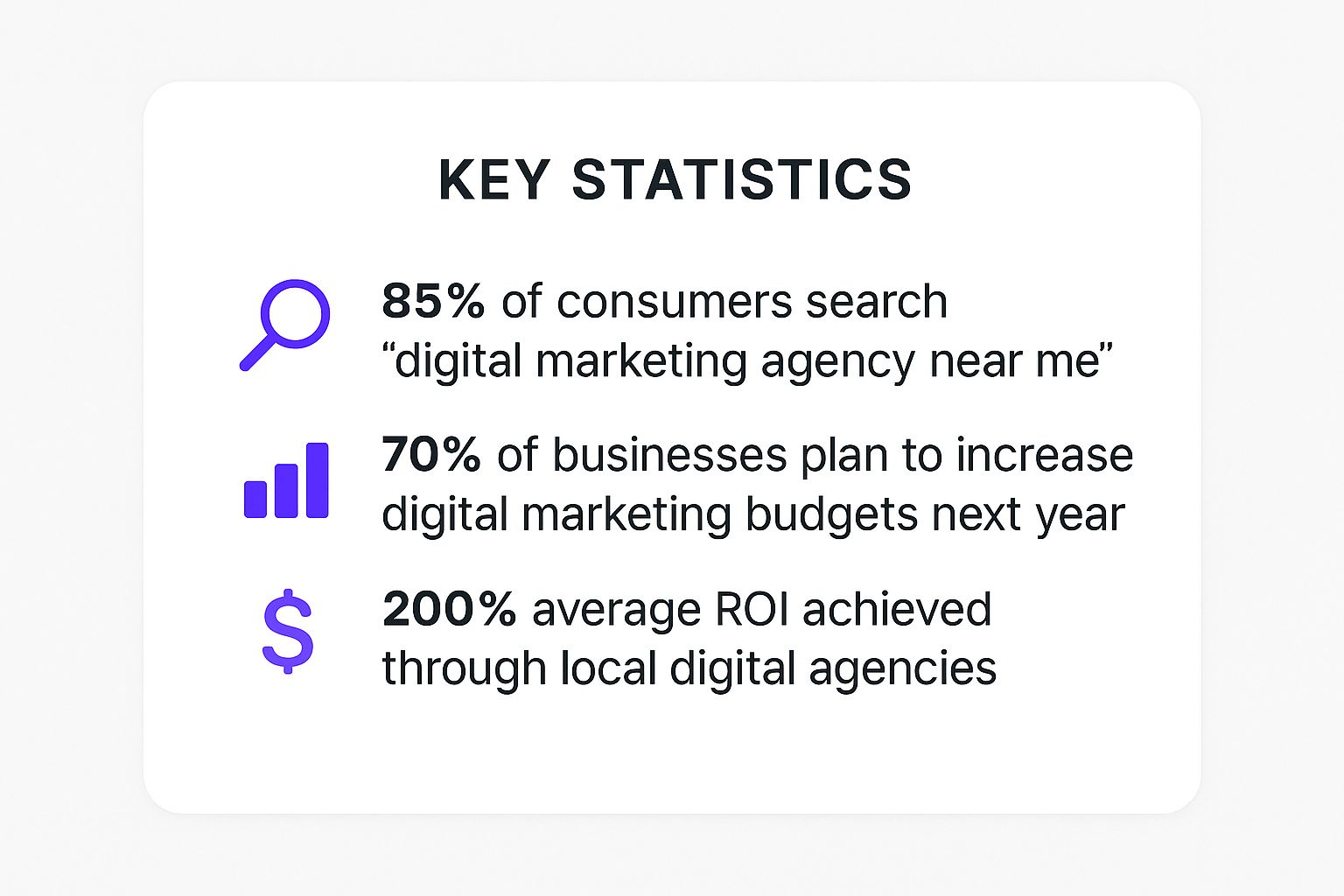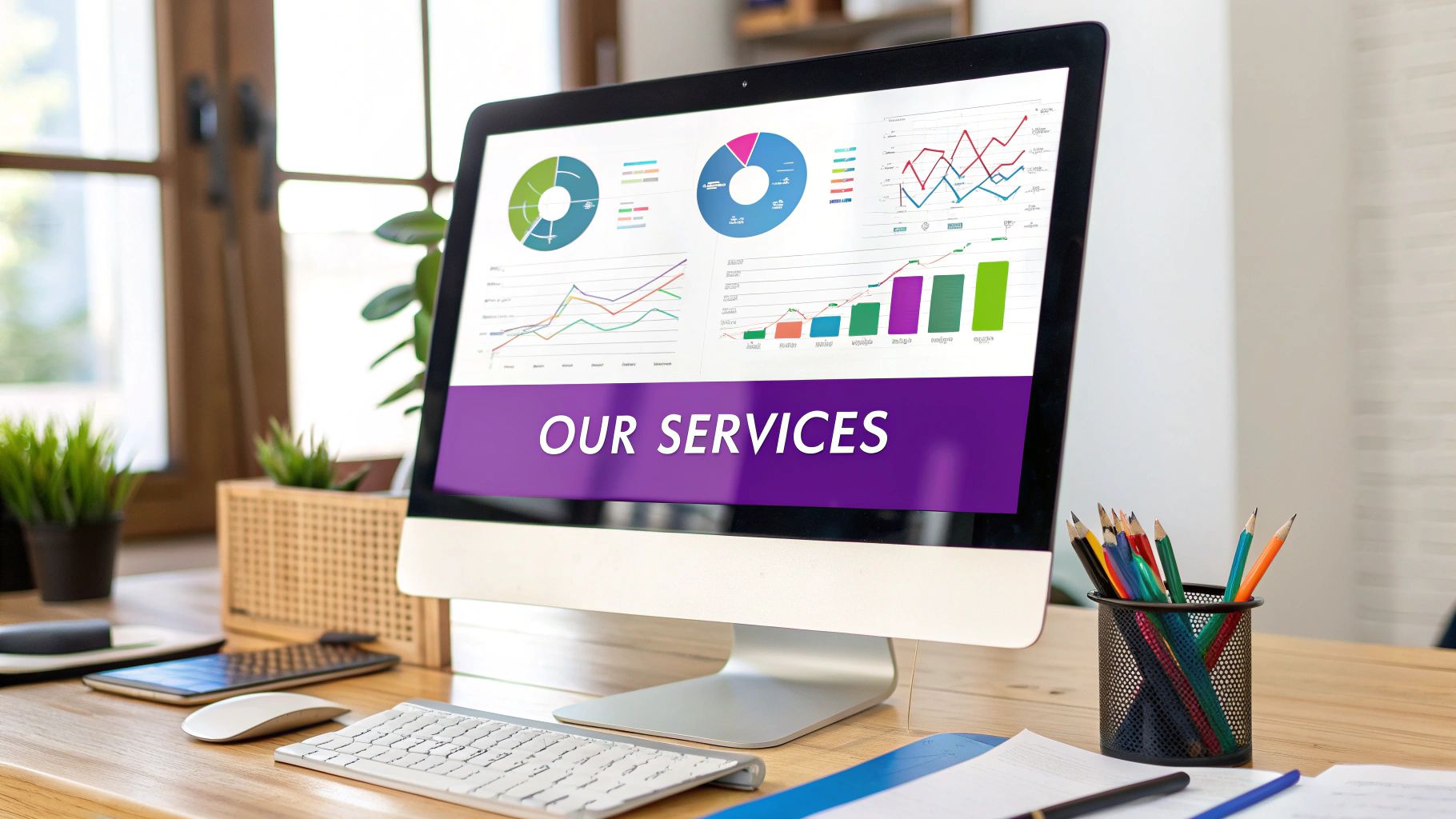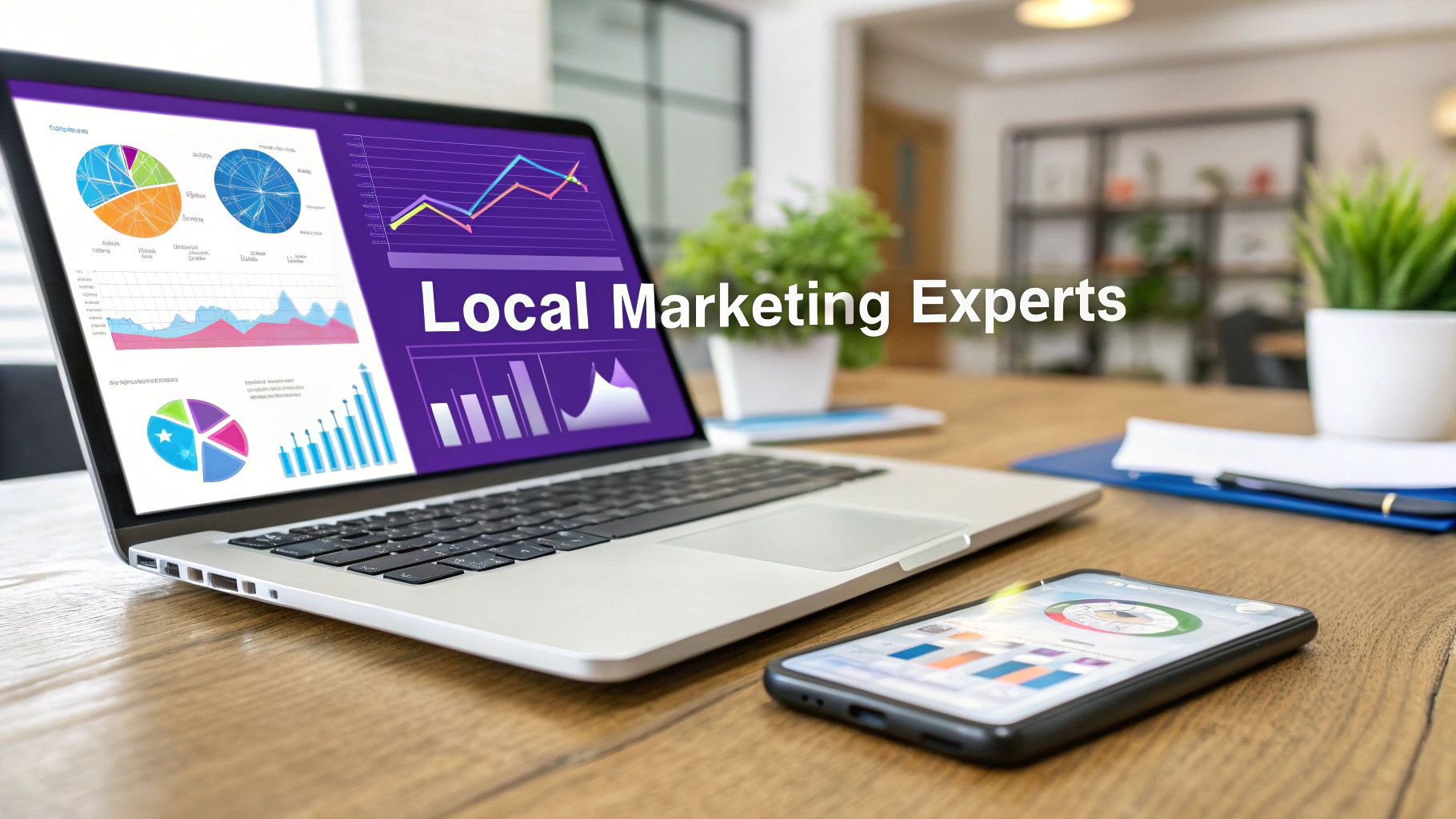Find the Best Digital Marketing Agency Near Me
Typing "digital marketing agency near me" into Google isn't just about finding the closest option—it's a smart, strategic move. You're looking for a partner who gets the unique vibe of your local market. A local agency brings an irreplaceable feel for community dynamics, regional customer habits, and the kind of face-to-face accountability you just can't get from a remote firm.
The Real Value of a Local Marketing Partner
Choosing a local agency means you're not just hiring another vendor; you're basically extending your team. Imagine brainstorming campaign ideas over coffee or having your agency pop by a local event to see your customers in their natural habitat. That kind of closeness builds a much deeper connection and a more responsive partnership.
When something unexpected pops up, a quick phone call or an in-person meeting can sort it out way faster than a long, drawn-out email chain ever could.
This infographic really nails down why so many businesses are keeping their search close to home.

The numbers don't lie. Local searches are where the action is, businesses are ready to invest, and local agencies are delivering some seriously impressive results.
Understanding the Local Advantage
A local partner’s true value is rooted in a shared world. They shop at the same grocery stores, get stuck in the same traffic, and see the same local news you do.
This shared experience translates into marketing campaigns that just feel right to your target audience. For instance, they instinctively know that tying a promotion to the annual Founder's Day festival will create more buzz than some generic holiday sale. This is a cornerstone of effective digital marketing for your local business.
The industry's growth really highlights this trend. Here in the U.S., the digital advertising agency sector is on track to hit $52.4 billion in revenue in 2024, a surge driven by businesses hunting for that specialized, local expertise.
A local agency doesn't just work for your community; they are part of it. This intrinsic connection allows them to craft messages that feel genuine, building trust and driving engagement in a way that a national firm, hundreds of miles away, rarely can.
To really get why a local partner is such a game-changer, it helps to explore the powerful local business marketing strategies they can roll out to connect with your community and fuel your growth. Their ability to leverage that hometown knowledge is their greatest asset—and soon, it’ll be yours, too.
Setting Clear Goals Before You Start Searching

Before you even think about Googling "digital marketing agency near me," stop. The single most important thing you can do is figure out what success actually looks like for your business.
Without clear goals, you’re just flying blind. You can't possibly know if an agency is steering you in the right direction if you haven't defined the destination. Vague wishes like "get more leads" or "build our online presence" are just not enough to get the job done. They’re unactionable.
You need goals that are specific, measurable, and tied directly to your bottom line. For instance, a local law firm shouldn't just want more leads; they need more qualified consultations. A much better, sharper goal would be to increase qualified, local client consultations from organic search by 15% over the next quarter.
See the difference? This kind of clarity completely changes the conversation with potential agencies. You’ll instantly filter out the ones spouting buzzwords and zero in on the strategists who actually get your business.
From Business Aims to Marketing Metrics
This is where the rubber meets the road: connecting your big-picture business objectives to tangible marketing metrics. If your main goal is to grow revenue by 10% this year, how, specifically, is marketing going to help you get there? It’s time to break it down.
Here’s how you can translate those broad ambitions into concrete Key Performance Indicators (KPIs) that an agency can actually hit:
- Your Business Goal: Get more people walking into your retail store.
- A Solid Marketing KPI: Boost clicks on the "Get Directions" button in your Google Business Profile by 25%.
- Your Business Goal: Ramp up online sales for your e-commerce shop.
- A Solid Marketing KPI: Improve the website’s conversion rate from 1.5% to 2.5% and slash shopping cart abandonment by 20%.
By defining the finish line before the race even starts, you give yourself the power to judge agency proposals like a pro. You'll be able to spot the partners who can deliver real, measurable results—not just fluffy activity reports.
Once you have these targets nailed down, you need a realistic budget. Knowing what you're willing and able to invest lets a good agency build a practical, results-focused proposal that fits your financial reality. This prep work is what separates finding a true partner from just hiring another vendor.
How to Vet an Agency's Past Performance

An agency’s portfolio is their resume, their highlight reel, and their proof all rolled into one. When you’re hunting for a "digital marketing agency near me," you need a partner with a real history of moving the needle—not just someone who can assemble a flashy PowerPoint.
Your job is to learn how to read between the lines.
A lot of portfolios are stuffed with vanity metrics. Think "boosted social media followers" or "skyrocketed website traffic." These sound great on the surface, but they don't pay the bills. A 50% traffic increase means absolutely nothing if none of those new visitors actually bought something.
You have to dig deeper. It's about asking the right questions—the sharp ones that get straight to the bottom line.
Beyond the Polished Case Study
A solid case study tells the whole story, warts and all. A flimsy one is just a highlight reel. As you review their work, be ready to probe for the details that actually prove their worth. This is especially true when choosing a digital marketing agency for startups, where every single marketing dollar needs to punch above its weight.
Here are a few questions that will cut through the fluff and show you what an agency is really made of:
- Financial Impact: "What was the exact Return on Investment (ROI) for this project, and how did you guys measure it?" This question forces them to connect their pretty designs directly to cold, hard cash.
- Problem-Solving Skills: "Walk me through a major roadblock you hit during this campaign. What went wrong, and what specific steps did you take to fix it?" This reveals how they handle pressure and think on their feet.
- Client Collaboration: "How did the client's goals shift mid-project, and how did your team pivot the strategy?" This uncovers their flexibility and communication style when things get messy.
A great agency won't flinch when you ask about the tough stuff. They’ll see it as a chance to show off their problem-solving chops and prove they can handle the inevitable chaos that comes with any real marketing campaign.
For instance, a weak case study will say something vague like, "We grew their organic traffic." A strong one gets specific: "We increased organic traffic from qualified local leads by 45%, which led to a 20% rise in demo requests and a 1.5x ROI within six months."
See the difference? It’s all about data-backed results that tie directly back to business goals. Don’t settle for anything less.
What to Ask a Digital Marketing Agency Before You Hire Them

Alright, you've narrowed down your list and you’re sitting down for that first real conversation. This meeting is an interview—and you’re the one in the hiring seat. It's your chance to get past the slick sales pitch and see how the agency actually operates.
Don’t waste your time with softball questions. Asking "Who will I work with?" is fine, but it’s a surface-level question that gets you a surface-level answer. We need to dig deeper to find out what it will really be like to partner with them.
Peeking Behind the Curtain: People and Process
A great partnership is built on two things: transparency and communication. Your goal here is to figure out exactly who will be steering your ship and what happens when you hit rough waters.
Toss these questions into the conversation:
- Who is my actual day-to-day contact? Get a name. Then, ask about their background and—this is the important part—what their current client-to-manager ratio is. A rockstar account manager buried under 30 other clients won't have the bandwidth to give your business the attention it deserves.
- Walk me through what happens when a campaign isn't hitting its goals. This is where you separate the pros from the pretenders. You're listening for a process that involves digging into the data, testing new strategies, and proactively communicating with you. If you get a whiff of excuses or finger-pointing, run.
- Can I see a sample report? A flashy dashboard full of vanity metrics is a red flag. A great report tells a story, connecting their daily activities directly to your business goals and the KPIs that you actually care about, like leads, sales, and cost per acquisition.
Any agency worth its salt will welcome these kinds of questions. They see it as a chance to flex their expertise and prove they're a transparent, results-driven partner who's genuinely invested in seeing you win.
Talking Money, Ownership, and the Fine Print
Finally, let's get down to the brass tacks. Getting clarity on the financial side of things now will save you from massive headaches later. Don't be shy about it.
Be direct when you talk about their pricing model. Is it a monthly retainer, project-based, or hourly? This is critical for comparing apples to apples with other proposals. Agency rates are a serious investment. For context, in 2025, 36% of agencies were charging between $175-$199 per hour. You can dig into more 2025 digital agency pricing trends on prometheanresearch.com to get a feel for the market.
And before you wrap up, ask this deal-breaker question: If we part ways, who owns all the digital assets? This includes your ad accounts, analytics data, website content, and creative files. The only acceptable answer is "You do." A trustworthy partner builds your assets in your name, ensuring you hold the keys to your own kingdom, no matter what.
Gauging Their Expertise in Modern Marketing
The digital marketing world moves at warp speed. What worked last year is probably already collecting dust on a shelf. When you’re looking for a local partner, you need a team that’s living in the now, not one still clinging to strategies from five years ago.
You're not just hiring someone to manage basic SEO or post a few times on social media. You need a team that can give you a real competitive edge. Are they talking about AI-powered analytics to uncover hidden customer behaviors? Do they have a sharp, informed take on social commerce or how to partner with creators authentically? These aren't just buzzwords; they're the tools of the trade for any agency worth its salt today.
Are They Actually Forward-Thinking?
Don't be shy about digging deep. Vague, fluffy answers are a massive red flag. The right partner will be excited to show you what they know and how they apply it. This is your chance to separate the talkers from the doers.
Toss a few of these questions their way and see how they handle them:
- On AI: "Can you walk me through a real example of how you've used an AI tool to boost campaign results for a client like us?"
- On Platforms: "What's your game plan for reaching younger audiences on places like TikTok or other emerging channels?"
- On Efficiency: "How do you approach marketing process optimization for agencies to make sure our campaigns run like a well-oiled machine?"
Their answers will tell you everything you need to know.
Think about it: social content now has a huge impact on how people buy things. In fact, 76% of users say what they see on social media sways their purchasing decisions. For Gen Z, that number shoots up to an insane 90%. An agency that isn't fluent in this reality is already falling behind.
You can learn more about how social media impacts purchasing decisions on marketingdive.com. And if you're looking to build your own modern plan, check out our guide on how to create a digital marketing strategy that actually works in today's world.
Making Your Final Decision with Confidence
Alright, you've made it through the gauntlet. After weeks of calls, demos, and wading through proposals, you’ve probably got your list of potential agencies down to two or three solid contenders. This is where it gets tough. The presentations are polished, the promises are big, and everyone seems like a perfect fit.
So, how do you cut through the noise and make the right call? It’s time to move past the sales pitch and focus on what really predicts a great long-term partnership.
First, lay out their proposals side-by-side. I'm not just talking about the price tag at the bottom. Scrutinize what's actually included. One agency might have a lower monthly retainer, but are they skimping on strategy hours? Another might seem expensive, but that price could reflect a far more comprehensive plan. This isn't about finding the cheapest option—it’s about finding the best value for the goals you need to hit.
Beyond the Proposal: Getting to the Truth
Now for the human part. Checking references is a no-brainer, but most people ask the wrong questions. Don't just ask if they were "happy" with the agency. That's a softball question that gets you a generic "yes."
You need to dig deeper. Ask pointed questions that reveal how the agency handles the messy, unpredictable reality of marketing:
- "Tell me about a time the agency had to pivot strategy unexpectedly. How did they handle it?"
- "How proactive was your account manager? Did you have to chase them for updates?"
- "Did you ever feel like your feedback was just being heard, or was it genuinely incorporated into the campaigns?"
The answers to these questions will give you a real glimpse into what it’s like to work with them day-to-day, especially when things aren't going perfectly.
Trust your gut, but back it up with facts. A great cultural fit is crucial, but it can't make up for a weak strategy. The sweet spot is an agency that nails both the technical expertise and the collaborative spirit.
Finally, take a hard look at their tech stack and fluency. A modern agency can't just be creative; they have to be dialed into the tools that drive efficiency and results. A simple but telling question to ask is about their experience with and adoption of top marketing AI tools.
This isn't about being trendy. It’s a gut check to see if they’re just keeping up or if they're actively looking for ways to give their clients a competitive edge. Their answer will tell you a lot about whether they’re built for the future or stuck in the past.
Got Questions? We've Got Answers
When you're searching for a "digital marketing agency near me," a few questions always pop up. Let's cut through the noise and get you some straight answers.
What’s a Realistic Budget for a Local Agency?
Look, there’s no magic number here. The cost really boils down to what you’re trying to achieve and which services will get you there.
For a small local business just dipping its toes in, a focused local SEO package might run you $1,500-$2,500 a month. If you’re ready to go bigger with a full-blown strategy—think paid ads, content creation, the whole nine yards—you're looking at a range of $5,000 to over $10,000 monthly.
The real goal isn't to find the cheapest price tag; it's to find the best value. Think about the potential return on your investment. A solid agency will build a proposal that lines up with your growth goals, and having a clear budget helps them do just that.
How Long Am I Locked into a Contract?
Most agencies need a little time to really get the engine running and show you meaningful results. You’ll find that initial contracts are often around six months. Some agencies might offer a 12-month deal with a slightly better rate.
This isn't just to lock you in—it gives them the runway they need to launch strategies, analyze the data, and start optimizing for real growth.
Once that initial period is up, many will happily switch to a month-to-month agreement, giving you a lot more flexibility.
When Will I Actually See Results?
Digital marketing is a marathon, not a sprint. It’s an investment in your business’s future, not an overnight lottery ticket.
Sure, you might get some quick wins from a paid ad campaign in the first month. But the foundational stuff, like SEO, takes time to gain traction.
Here’s what you can generally expect:
- Months 1-3: This is the setup phase. Think strategy sessions, technical fixes, and getting those first campaigns out the door. You’ll see activity, but don’t expect a massive ROI just yet.
- Months 4-6: Now we’re talking. As the optimization kicks in, you should start seeing real movement in the numbers that matter—more traffic, a steady flow of leads, and better keyword rankings.
Ready to skip the guesswork? Partner with Rebus for a clear, results-driven strategy built for your business. Let's make a plan that turns your marketing dollars into growth you can actually measure. Start the conversation with us today.

